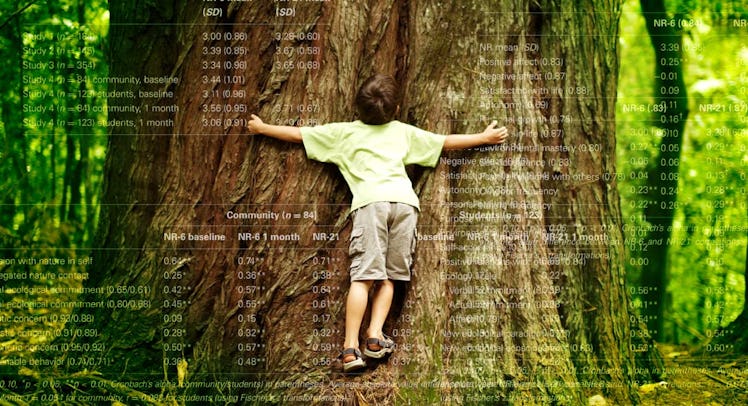How To Measure A Kid’s Love Of Nature
Scientists can measure a child's love of nature by asking them about connections.

Adults and children who feel personally connected with nature are more likely to be happy, healthy, and environmentally conscious, studies suggest. But the strength of that connection varies widely, and depends on circumstances. Some happy, healthy children gravitate toward the great outdoors; others seldom venture into their own backyards. Urban children, for whom nature consists of potted plants and the odd botanical garden are still capable of recycling.
Connection to nature, then, is less about time spent outdoors and more about an intrinsic connection to our natural roots. And to measure that, we’ll need a psychometric scale.
Meet The Nature Relatedness Scale (NR-6)
The Nature Relatedness Scale first came out in 2009 as a 21-question assessment, but has since been winnowed down to six key questions. To figure out your child’s level of connection to nature, ask him or her to respond to each of the following statements with Disagree Strongly (1), Disagree A Little (2), Neither Agree Nor Disagree (3), Agree A Little (4), Agree Strongly (5). To get a final, average nature-relatedness score, add up each response and divide the total by six.
- My ideal vacation spot would be a remote, wilderness area.
- I always think about how my actions affect the environment.
- My connection to nature and the environment is a part of my spirituality.
- I take notice of wildlife wherever I am.
- My relationship to nature is an important part of who I am.
- I feel very connected to all living things and the earth.
How Do I Interpret The Result?
Several studies involving thousands of participants have concluded that the average person scores between 3.00 and 3.71 in nature-relatedness. Any score higher than 4 should be considered a high level of nature relatedness. Anything below 3, a low level.
My Kid Hates Trees. Is That Going To Be A Problem?
First of all, don’t panic. Your test results are likely skewed, because psychometric tests are meant to be conducted under clinical conditions by trained administrators. Your kid’s responses could have been vastly different had he or she taken the NR-6 in a more professional setting.
But it could be an issue. The Biophilia Hypothesis states that, since humans evolved from nature, we have an innate need to connect with other life—such that our health and survival depends on it. Perhaps as a consequence of this, studies have shown that there are mood, cognitive, health, and longevity benefits associated with proximity to nature. Presumably, a child that runs away from trees and spurns greenery won’t get to see these advantages.
There are also implications for the long-term health of our planet. Studies have shown that people who feel less connected to nature are also more likely to contribute to environmentally-destructive behaviors. If you’re hoping to raise a kid who recycles and fights climate change, you may find it difficult to do so if he or she is revolted by greenery.
There isn’t a lot in the literature when it comes to indoctrinating a generation of tree-huggers. Individual states, including Texas and Alaska, have released statewide plans to increase environmental literacy among school-age children, and that’s a good start. But, as with anything in parenting, leading by example is key. If you love hiking, don’t mind getting dirt under your nails, and occasionally hug a tree, odds are your kids will embrace nature too. And as spring finally arrives in full force, now might be the perfect time to teach your kids to embrace nature.
This article was originally published on